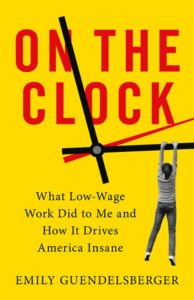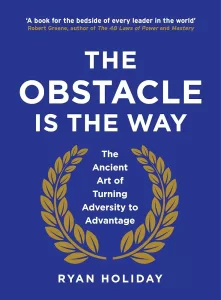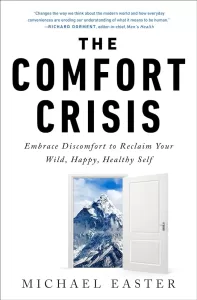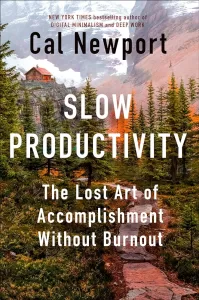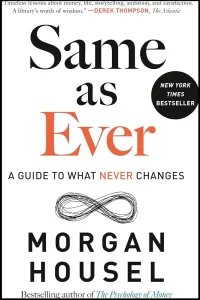Book Review: “On the Clock”
Book: On the Clock by Emily Guendelsberger
Reviewer: Bobby Powers
My Thoughts: 9 of 10
First-time author Emily Guendelsberger goes undercover to work three low-wage jobs (Amazon warehouse, call center, and McDonald's) to explore the economic forces plaguing American families today. Guendelsberger's stories are raw, detailed, heart-wrenching, and inspiring. She offers a timely depiction of what happens when humanity takes a backseat to capitalism and business efficiency. I don't say this often, but this is a book that everyone needs to read.
What I Learned from the Book
Millions of people in our society are working painful, soul-crushing, psychologically claustrophobic jobs today in order to earn a paycheck that will not even cover their basic living expenses. We're fed stories about how work is better now than ever before (job flexibility, freelancing, limitless perks, etc.) but in reality, many modern technological advancements have just made life more difficult for those working in low-wage jobs. Robust data scanners collect information on how long employees spend in the bathroom, algorithms write work schedules to maximize profitability by staffing busy shifts with skeleton crews, and assembly-line practices eliminate free will and thinking from thousands of jobs. Although depressing, this book is a much-needed wakeup call for what needs to change in our economy.
Selected Quotes and Ideas from the Book
Background
- "Nearly everyone with influence in this country, regardless of political affiliation, is incredibly insulated from how miserable and dehumanizing the daily experience of work has gotten over the past decade or two."
- "Despite all my research, I'm embarrassingly unprepared for what 'normal' means outside the white-collar world, and I've grossly misjudged what $10.50 an hour is worth to a lot of people. I'd expected the pain. I'd expected the monotony. I hadn't expected so many people to regard this as a decent job."
- "All three companies seemed desperate to hire enough felony- and opiate-free bodies to keep up with the massive turnover rate built into their business models...high turnover, and the consequent need to hire new bodies quickly and without scrutiny, is intentional. It's central to the way these companies operate."
- "The point isn't that these companies are uniquely horrible. It's that these technologies and practices are present in most other low-wage jobs, too. I chose these companies because of how well they've adapted to this system, but the system is the problem, not them."
Systemic Problems
- "This is one of those weird quirks of the US employment market. If a full-time employee is injured in the course of doing her job, she's eligible for workers' compensation—government-mandated employer coverage of medical costs and money to make up for injury-related lost wages. But freelancers, independent contractors, and seasonal or temp workers—like all of us here for orientation—are just out of luck."
- "80 percent of low-wage workers in the private sector don't get any paid time off."
- "Though American jobs have gotten safer, people's experience of them is at an all-time low. We're less likely to get killed or maimed at work than ever before, true. But we're also at record lows for job satisfaction, job security, free time, and feeling in control of our lives."
- "American workers have never felt unhappier or less secure at work, with only 37 percent satisfied with their jobs."
Emily's Experience at Amazon Warehouse
- Position: Picker (employee who walks around finding, scanning, and collecting items that people have ordered)
- Location: Amazon warehouse SDF8, which is a 2.5 million square foot warehouse located in Southern Indiana, across the river from Louisville, Kentucky
- "[The Amazon scanner guns] wirelessly upload your location and how long it's been since your last bar-code scan in real time. If you're going too slow, the scanner will display a message telling you so. If you go too slow too often, a 'coach' will come find you to tell you in person."
- "The real problem, I was told, was the subtler plague of injuries from working through pain for fear of getting fired for low productivity numbers. That's where Amazon really stood out—repetitive stress injuries."
- "When my alarm goes off for my second full day of picking, it is the worst my body's felt in my entire life...I pop Advil like candy all day, not even bothering to track when my last dose was..." But SDF8 is no stranger to pain like Emily's, so the Amazon management team installed painkiller vending machines for employees.
- "I came to SDF8 to understand what it feels like to work in a fulfillment center. But the thing I really and truly understand now is that, regardless of how broke I may be, I'm the upper class. I always will be. I won't ever really understand what it feels like to work here, because I know I get to leave."
- "Nearly every drop of 'brain work' has been wrung out of this job, like so many others...As more and more skill is stripped out of a job, the cost of turnover falls; eventually, training an ever-churning influx of new unskilled workers becomes less expensive than incentivizing people to stay by improving the experience of work or paying more."
- "Why should we have to work like this just to prove that we're worth shelter and food?" -Fellow Amazon employee
Emily's Experience at Convergys Call Center
- Position: Customer Service Representative
- Location: Call center located in Hickory, North Carolina
- "There's a huge body of research directly linking repetitive, low-control, high-stress work with increased risk of mental-health issues—particularly depression and anxiety. Many of these studies were actually conducted in call centers because they're such a perfect model of a low-control, high-stress workplace."
- "Okay, who is it this time?" -Paramedic arriving at the call center to respond (another) employee panic attack
- "Reps talked about constant monitoring and micro-management, having as little job control as assembly-line workers, and metric-obsessed bosses counting not just how many seconds you spend on every stage of a call but also how many you spend in the bathroom. A good rule of thumb: the more interest management takes in workers' use of the bathroom, the more that job is going to suck."
- "It's emphasized that we must make a sales offer on every single call unless the caller formally invokes his or her right not to hear it, and we must hear a clear 'no' three times before we're allowed to stop making offers."
- "I've been developing a sort of callus over the earnest part of myself that genuinely cares about the customers and wants to do a good job for them. It thickens every time someone says something terrible to me. As it gets tougher, I've become increasingly numb to my customer interactions, good and bad. It's harder for angry people to upset me, but I get much less pleasure from making people happy. This dead, muted feeling reminds me a lot of depression, and it worries me."
Emily's Experience at McDonald's
- Position: Cashier
- Location: Downtown San Francisco
- "Breaks and lunches at McDonald's are the least relaxing of anywhere I've worked...I've already gotten yelled at twice for being one minute late clocking back in after a short break, once involving my favorite accusation, 'time theft.'"
- "Our schedule at McDonald's is posted less than a day before it starts, and I never have any idea how many or which hours I'll be scheduled for. It would be tough to have hobbies under these conditions, and nearly impossible to hold down a second job. Yet again, I can't imagine how people with kids make this work."
- "Exhausted workers and impatient customers tend to create a feedback loop of frustration and negativity that makes for a really miserable day."
- "Today, corporations have weighed the costs of high turnover against the costs of making the experience of work less miserable, and, because workers and customers are both kind of stuck with them, they choose bad service, terrible work conditions, and high turnover...it's like this because the unskilled labor pool can't vote with their feet when everywhere sucks."
- "Escape is possible; things don't have to be like this. The current way we've arranged our society is not inevitable, and it's far from natural. America got this way because we spent the past half century outsourcing the running of society to technology, data, and free markets—even though none of those things can tell if everyone's miserable."
Think you’d like this book?
Other books you may enjoy:
- Nickeled and Dimed by Barbara Ehrenreich
- The Everything Store by Brad Stone
Other notable books by the author:
- (None)
Want to become a stronger leader?
Sign up to get my exclusive
10-page guide for leaders and learners.
